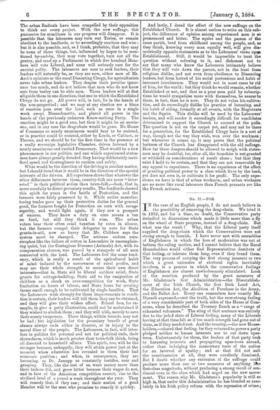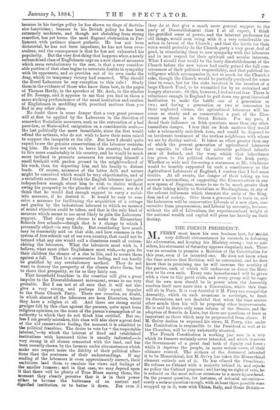No. II. — FOR.
IN the case of an English people, I do not much believe in the possibility of removing the drag-chain. We tried it in 1832, and for a time, no doubt, the Conservative party dwindled to dimensions which made it little more than a fly on the wheel of State progress, instead of a drag-chain. But what was the result ? Why, that the Liberal party itself supplied the drag-chain which the Conservatives were not strong enough to furnish. I have never met with assemblies of Englishmen in which the love of moderation was not at bottom the ruling motive, and I cannot believe that the Rural Householders would either find Representatives destitute of that feeling, or tolerate them long, even if they found them. The very process of carrying the first strong measure or two which a great extension of electoral rights inevitably involves, is a process in which the conservative feelings of Englishmen are almost unwholesomely stimulated. Look at the reaction produced by the great measures of Mr. Gladstone's first Administration—the Disestablish- ment of the Irish Church, the first Irish Land Act, the Education Act, the Abolition of Purchase in the Army, and the Ballot Act. Every one remembers how exactly Mr. Disraeli expressed,—not the truth, but the over-strung feeling of a very considerable part of both sides of the House of Com- mons, when he described the Treasury Bench as a " range of exhausted volcanoes." The sting of that sentence was entirely due to the jaded state of Liberal feeling, many of the Liberals having at that time felt as if too much strength had gone out of them, as if they needed rest. And the country,—the new House- holders,—shared that feeling, for they returned to power a party pledged neither to harass interests nor to cut down upas- trees. Unfortunately for them, the leaders of that party took to harassing interests and propagating upas-trees abroad, rather than indulging the momentary taste of the nation for an interval of apathy ; and as that did not suit the constituencies at all, they were cavalierly dismissed. But I doubt whether any extension of the suffrage could produce more than one or two measures of anything Ake first-class magnitude, without producing a strong recoil of sen- timent even in the class which had urged on the new move- ment. The reason why Mr. Gladstone's popularity is still so high is, that under this Administration he has blended so reso- lutely in his Irish policy reform with the repression of crime;
because in his foreign policy he has shown no tinge of doctrin- aire fanaticism ; because in his British policy he has been extremely moderate, and though not shrinking from strong remedies, has yet borne the most flagrant obstruction in Par- liament with patience almost pathetic. He has not been dictatorial, he has not been impatient, he has not been over- zealous, and the consequence is that he has not exhausted his popularity. But the very first thing that happens when a newly enfranchised class of Englishmen urge on a new class of measures which seem revolutionary to the rest, is that a very consider- able portion of that class begins to entertain doubts in sympathy with its opponents, and so provides out of its own ranks the drag, which its temporary victory had removed. Why should the Rural Labourers be any exception to this rule ? Study them in the evidence of those who know them best, in the pages of Thomas Hardy, in the speeches of Mr. Arch, in the studies of Dr. Jessopp, and it appears to me that you find in them a more striking predominance of the usual hesitation and caution of Englishmen in meddling with practical matters than you find in any other class.
No doubt there is some danger that a very great pressure will at first be applied by the Labourers in the direction of somewhat Socialistic measures, such as the restoration of a bad poor-law, or State-aided emigration on a considerable scale,— the last politically the more formidable, since the first would offend the artisans, who do not wish to have their rates raised to support the incapable or the idle. But here I should quite expect to see the genuine conservatism of the labmirer restrain- ing him. He does not wish to leave his country, but rather to live more comfortably in his country, and he would be much more inclined to promote measures for securing himself a small freehold with garden ground in the neighbourhood of his work, than for deporting him and his family to distant lands. Of course, measures of the latter drift and nature might be conceived which would be very objectionable, and of a socialistic nature. But I think the English labourer has quite independence enough about him to wish to thrive without owing his prosperity to the plunder of other classes ; nor do I think that he would find enough support to carry a social- istic measure, if he desired it. It would be easy to con- ceive a measure for facilitating the acquisition of a cottage and garden by the industrious labourer to which no manner of sound objection could be taken, and that is the only kind of measure which seems to me most likely to gain the Labourers' support. That they may choose to make the Elementary Schools free schools—though that is a change to which I personally object—is very likely. But considering how much may be reasonably said on that side, and how common is the system of free schools out of our own country, that could not be termed what any one would call a disastrous result of enfran- chising the labourers. What the labourers most wish is, I believe, what most other Englishmen most wish,—to gain for their children the chance of a rise in life, and to secure them against a fall. That is a conservative feeling, and can hardly be gratified by any revolutionary method. They do not want to destroy the prosperity of the classes above them, but to share that prosperity, so far as they fairly can.
That household franchise in the counties will give a great impulse to the Disestablishment movement, seems to me very probable. But I am not at all sure that it will not also give a very strong, and perhaps fully equal, impulse to the State Church Party. There are counties, no doubt, in which almost all the labourers are keen Dissenters, where they have a religion at all. And there are strong social grudges felt by this class against the parsons, quite apart from religious opinions, on the score of the parson's assAmption of an authority to which they do not think him entitled. But un- less I am greatly mistaken, this class will also show a great deal of the old conservative feeling, the moment it is admitted to the political franchise. The desire to vote for " the respectable interest,"—by which the interest of fixed and established institutions with honoured titles is usually indicated,—is very strong in all classes connected with the land, and has been recently shown by the farmers under circumstances which make one respect more the fidelity of their political affec- tions than the acuteness of their understandings. If my reading of the labourers is even approximately correct, their ambitions lead them to emulate the views and feelings of the smaller farmers ; and in that case, we may depend upon it that there will be plenty of True Blues among them, the moment they clearly perceive that it is in their power either to become the buttresses of an ancient and dignified institution, or to batter it down. But even if they do at first give a much more general support to the party of Disestablishment than I at all expect, I think the gratified sense of power, and the inherent preference for old things, would soon bring with it a very considerable re- action in favour of the Church ; and that the battle for their votes would probably do the Church party a very great deal of good, in stimulating them to new sympathy with the labourers and to new respect for their spiritual and secular interests. What I Should fear would be the hasty disestablishment of the Church before the new voters had really gained the full con- sciousness of their political responsibility, and that political in- telligence which accompanies it, not so much for the Church's sake, though the Church would be partially paralysed for some time to come, but for the risks involved in the creation of a large Church Fund, to be scrambled for by an untrained and hungry electorate. Of this, however, I feel no real fear. There is reluctance enough in England to pull down any great historical institution to make the battle one of a generation or two ; and during a generation or two of concession to their neglected claims, the agricultural labourers will be- come as steady and as conservative a part of the Elec- torate as there is in Great Britain. For my part, I dread their influence on Irish questions more than any other immediate danger. I fear that on Irish matters they would take a vehemently anti-Irish tone, and would be disposed to an intolerant treatment of the restless neighbours with whom we are by destiny united. It takes an effort greater than any of which the present generation of agricultural labourers are capable, to allow for the miserable political inherit- ance of Ireland, and the warp which that inheritance has given to the political character of the Irish party. Whether so wide and far-seeing a statesman as Mr. Gladstone would be heartily supported by such a constituency as the Agricultural Labourers of England, I confess that I feel some doubts. At all events, the danger of their taking up too narrow a nationalism, of supporting the Conservatives in any new spasm of Jingoism, seems to me to be much greater than of their taking kindly to Socialism or Bradlaughism, or any of the solvent influences which threaten the unity of the King dom and of society. Give them a generation to train in, and the Labourers will be conservative Liberals of a new class, con- servative from prepossession, and Liberal by necessity, because, without the aid of Liberalism, the superincumbent weight of the national wealth and capital will press too heavily on their destiny.







































 Previous page
Previous page